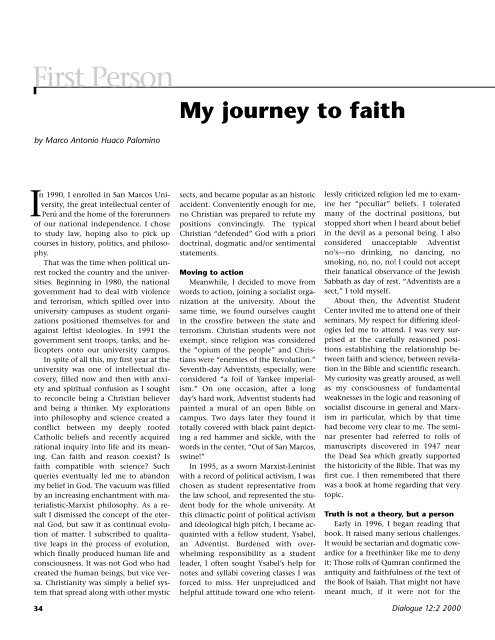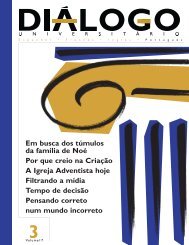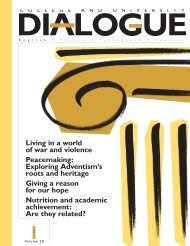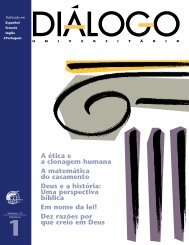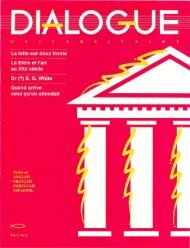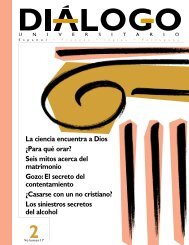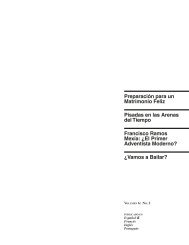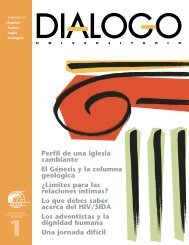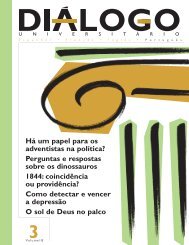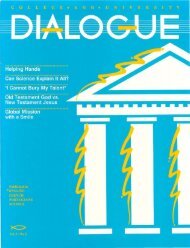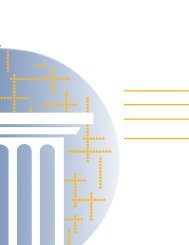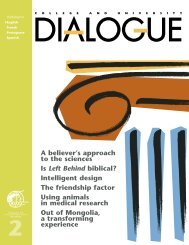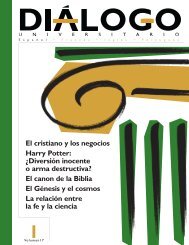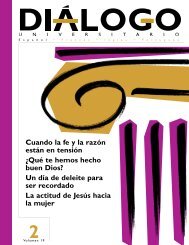2 - College and University Dialogue - General Conference of ...
2 - College and University Dialogue - General Conference of ...
2 - College and University Dialogue - General Conference of ...
Create successful ePaper yourself
Turn your PDF publications into a flip-book with our unique Google optimized e-Paper software.
First Person<br />
My journey to faith<br />
by Marco Antonio Huaco Palomino<br />
In 1990, I enrolled in San Marcos <strong>University</strong>,<br />
the great intellectual center <strong>of</strong><br />
Perú <strong>and</strong> the home <strong>of</strong> the forerunners<br />
<strong>of</strong> our national independence. I chose<br />
to study law, hoping also to pick up<br />
courses in history, politics, <strong>and</strong> philosophy.<br />
That was the time when political unrest<br />
rocked the country <strong>and</strong> the universities.<br />
Beginning in 1980, the national<br />
government had to deal with violence<br />
<strong>and</strong> terrorism, which spilled over into<br />
university campuses as student organizations<br />
positioned themselves for <strong>and</strong><br />
against leftist ideologies. In 1991 the<br />
government sent troops, tanks, <strong>and</strong> helicopters<br />
onto our university campus.<br />
In spite <strong>of</strong> all this, my first year at the<br />
university was one <strong>of</strong> intellectual discovery,<br />
filled now <strong>and</strong> then with anxiety<br />
<strong>and</strong> spiritual confusion as I sought<br />
to reconcile being a Christian believer<br />
<strong>and</strong> being a thinker. My explorations<br />
into philosophy <strong>and</strong> science created a<br />
conflict between my deeply rooted<br />
Catholic beliefs <strong>and</strong> recently acquired<br />
rational inquiry into life <strong>and</strong> its meaning.<br />
Can faith <strong>and</strong> reason coexist? Is<br />
faith compatible with science? Such<br />
queries eventually led me to ab<strong>and</strong>on<br />
my belief in God. The vacuum was filled<br />
by an increasing enchantment with materialistic-Marxist<br />
philosophy. As a result<br />
I dismissed the concept <strong>of</strong> the eternal<br />
God, but saw it as continual evolution<br />
<strong>of</strong> matter. I subscribed to qualitative<br />
leaps in the process <strong>of</strong> evolution,<br />
which finally produced human life <strong>and</strong><br />
consciousness. It was not God who had<br />
created the human beings, but vice versa.<br />
Christianity was simply a belief system<br />
that spread along with other mystic<br />
sects, <strong>and</strong> became popular as an historic<br />
accident. Conveniently enough for me,<br />
no Christian was prepared to refute my<br />
positions convincingly. The typical<br />
Christian “defended” God with a priori<br />
doctrinal, dogmatic <strong>and</strong>/or sentimental<br />
statements.<br />
Moving to action<br />
Meanwhile, I decided to move from<br />
words to action, joining a socialist organization<br />
at the university. About the<br />
same time, we found ourselves caught<br />
in the crossfire between the state <strong>and</strong><br />
terrorism. Christian students were not<br />
exempt, since religion was considered<br />
the “opium <strong>of</strong> the people” <strong>and</strong> Christians<br />
were “enemies <strong>of</strong> the Revolution.”<br />
Seventh-day Adventists, especially, were<br />
considered “a foil <strong>of</strong> Yankee imperialism.”<br />
On one occasion, after a long<br />
day’s hard work, Adventist students had<br />
painted a mural <strong>of</strong> an open Bible on<br />
campus. Two days later they found it<br />
totally covered with black paint depicting<br />
a red hammer <strong>and</strong> sickle, with the<br />
words in the center, “Out <strong>of</strong> San Marcos,<br />
swine!”<br />
In 1995, as a sworn Marxist-Leninist<br />
with a record <strong>of</strong> political activism, I was<br />
chosen as student representative from<br />
the law school, <strong>and</strong> represented the student<br />
body for the whole university. At<br />
this climactic point <strong>of</strong> political activism<br />
<strong>and</strong> ideological high pitch, I became acquainted<br />
with a fellow student, Ysabel,<br />
an Adventist. Burdened with overwhelming<br />
responsibility as a student<br />
leader, I <strong>of</strong>ten sought Ysabel’s help for<br />
notes <strong>and</strong> syllabi covering classes I was<br />
forced to miss. Her unprejudiced <strong>and</strong><br />
helpful attitude toward one who relentlessly<br />
criticized religion led me to examine<br />
her “peculiar” beliefs. I tolerated<br />
many <strong>of</strong> the doctrinal positions, but<br />
stopped short when I heard about belief<br />
in the devil as a personal being. I also<br />
considered unacceptable Adventist<br />
no’s—no drinking, no dancing, no<br />
smoking, no, no, no! I could not accept<br />
their fanatical observance <strong>of</strong> the Jewish<br />
Sabbath as day <strong>of</strong> rest. “Adventists are a<br />
sect,” I told myself.<br />
About then, the Adventist Student<br />
Center invited me to attend one <strong>of</strong> their<br />
seminars. My respect for differing ideologies<br />
led me to attend. I was very surprised<br />
at the carefully reasoned positions<br />
establishing the relationship between<br />
faith <strong>and</strong> science, between revelation<br />
in the Bible <strong>and</strong> scientific research.<br />
My curiosity was greatly aroused, as well<br />
as my consciousness <strong>of</strong> fundamental<br />
weaknesses in the logic <strong>and</strong> reasoning <strong>of</strong><br />
socialist discourse in general <strong>and</strong> Marxism<br />
in particular, which by that time<br />
had become very clear to me. The seminar<br />
presenter had referred to rolls <strong>of</strong><br />
manuscripts discovered in 1947 near<br />
the Dead Sea which greatly supported<br />
the historicity <strong>of</strong> the Bible. That was my<br />
first cue. I then remembered that there<br />
was a book at home regarding that very<br />
topic.<br />
Truth is not a theory, but a person<br />
Early in 1996, I began reading that<br />
book. It raised many serious challenges.<br />
It would be sectarian <strong>and</strong> dogmatic cowardice<br />
for a freethinker like me to deny<br />
it: Those rolls <strong>of</strong> Qumran confirmed the<br />
antiquity <strong>and</strong> faithfulness <strong>of</strong> the text <strong>of</strong><br />
the Book <strong>of</strong> Isaiah. That might not have<br />
meant much, if it were not for the<br />
34 <strong>Dialogue</strong> 12:2 2000


